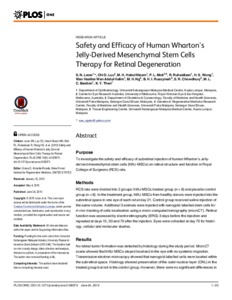Citation
Leow, S. N. and Luu, Chi D. and Hairul Nizam, M. H. and Mok, Pooi Ling and Ruhaslizan, R. and Wong, H. S. and Wan Abdul Halim, Wan Haslina and Ng, M. H. and Ruszymah, B. H. I. and Chowdhury, S. R. and Bastion, M. L. C. and Then, K. Y.
(2015)
Safety and efficacy of human Wharton's Jelly-derived mesenchymal stem cells therapy for retinal degeneration.
PLOS ONE, 10 (6).
art. no. e0128973.
pp. 1-20.
ISSN 1932-6203
Abstract
Purpose
To investigate the safety and efficacy of subretinal injection of human Wharton’s Jelly-derived mesenchymal stem cells (hWJ-MSCs) on retinal structure and function in Royal College of Surgeons (RCS) rats.
Methods
RCS rats were divided into 2 groups: hWJ-MSCs treated group (n = 8) and placebo control group (n = 8). In the treatment group, hWJ-MSCs from healthy donors were injected into the subretinal space in one eye of each rat at day 21. Control group received saline injection of the same volume. Additional 3 animals were injected with nanogold-labelled stem cells for in vivo tracking of cells localisation using a micro-computed tomography (microCT). Retinal function was assessed by electroretinography (ERG) 3 days before the injection and repeated at days 15, 30 and 70 after the injection. Eyes were collected at day 70 for histology, cellular and molecular studies.
Results
No retinal tumor formation was detected by histology during the study period. MicroCT scans showed that hWJ-MSCs stayed localised in the eye with no systemic migration. Transmission electron microscopy showed that nanogold-labelled cells were located within the subretinal space. Histology showed preservation of the outer nuclear layer (ONL) in the treated group but not in the control group. However, there were no significant differences in the ERG responses between the groups. Confocal microscopy showed evidence of hWJ-MSCs expressing markers for photoreceptor, Müller cells and bipolar cells.
Conclusions
Subretinal injection of hWJ-MSCs delay the loss of the ONL in RCS rats. hWJ-MSCs appears to be safe and has potential to differentiate into retinal-like cells. The potential of this cell-based therapy for the treatment of retinal dystrophies warrants further studies.
Download File
![[img]](http://psasir.upm.edu.my/46215/1.hassmallThumbnailVersion/Safety%20and%20efficacy%20of%20human%20Wharton%27s%20Jelly-derived%20mesenchymal%20stem%20cells%20therapy%20for%20retinal%20degeneration.PDF)  Preview |
|
Text
Safety and efficacy of human Wharton's Jelly-derived mesenchymal stem cells therapy for retinal degeneration.PDF
Download (13MB)
| Preview
|
|
Additional Metadata
Actions (login required)
 |
View Item |

